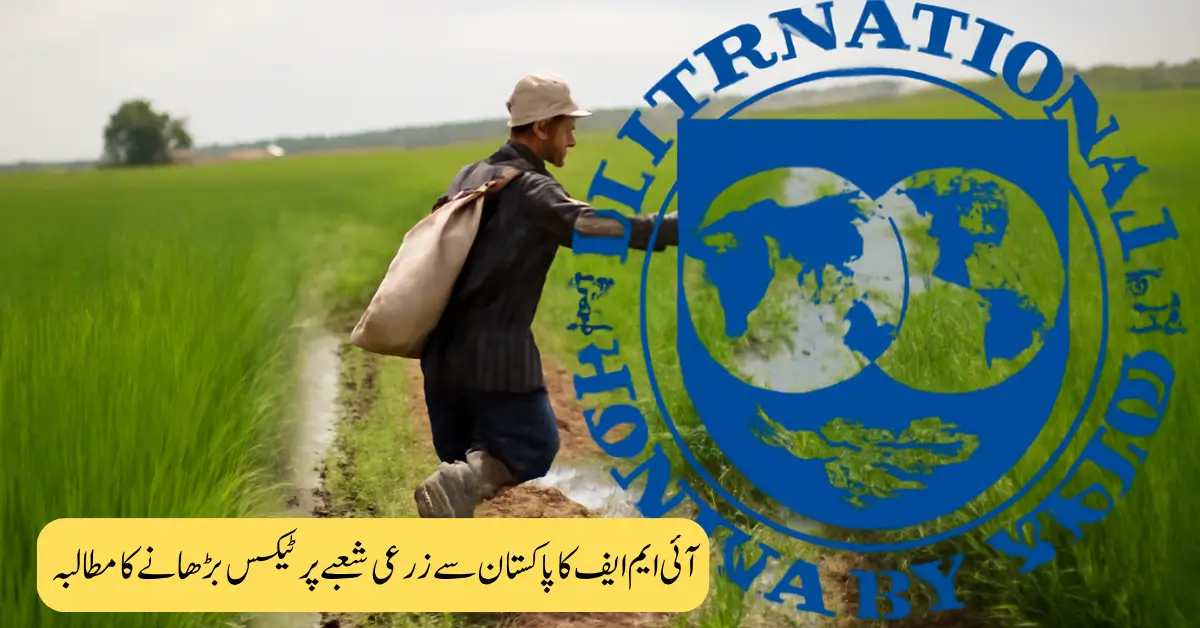IMF Proposes Doubling of Federal Excise Duty on Fertilizers & Pesticides
Pakistan’s agriculture sector is facing tough challenges, with the IMF Proposes doubling of Federal Excise Duty on Fertilizers & Pesticides, once again stepping in with a proposal that could further strain the farming community. The IMF has suggested that the government of Pakistan increase the Federal Excise Duty (FED) on fertilizers from 5% to 10%, and also impose a 5% FED on pesticides. This recommendation comes as Pakistan’s Federal Board of Revenue (FBR) is concerned that its tax collection will fall short by Rs 400 to 500 billion, impacting the country’s overall economic targets.
The Financial Strain on Pakistan’s Economy
The IMF’s demand is driven by the fact that Pakistan’s tax collection targets have not been met. Initially, the government set a tax target of Rs 14.130 trillion for the FBR, but in the first quarter, tax collections were Rs 198 billion lower than expected. To make up for this shortfall, the IMF is pushing for higher taxes, particularly on agricultural inputs like fertilizers and pesticides, which are essential for crop production.
The FBR’s target could now be revised to between Rs 13.89 trillion and Rs 13.963 trillion, but this comes with the risk of additional financial burdens on already struggling sectors. While the government has assured the IMF that these steps will be taken if tax collections fall short in the next review, it remains to be seen whether such measures will be effective without worsening the financial situation for the people of Pakistan.
Free Death Certificates Announced in Sindh After Cabinet’s Historic Approval
The Agricultural Crisis: Floods and Crop Damage
Pakistan’s agricultural sector is already grappling with severe losses due to natural disasters. Currently, around 3.3 million acres of agricultural land in Punjab are submerged under water due to floods. This has not only damaged large swaths of farmland but also significantly impacted cash crop production in 27 districts. The devastating effects of these floods have left many farmers in dire straits, and now, the IMF’s proposed tax hikes could exacerbate their hardships.
The flooding, combined with other challenges like the abolition of wheat support prices, has placed farmers in an extremely vulnerable position. Imposing additional taxes on fertilizers and pesticides at this time could further increase the financial burden on them, making it harder to recover from the ongoing crisis.
Political Reactions: Opposition to Increased Taxes
The proposal to increase the FED on fertilizers and pesticides has not gone unnoticed, with political figures speaking out against it. Naveed Qamar, a leader of the Pakistan Peoples Party (PPP) and former Finance Minister, has made it clear that his party will oppose any hike in taxes on agricultural inputs. He argues that farmers are already severely affected by the ongoing flood situation, as well as the government’s decision to remove the support price for wheat. The PPP is concerned that any increase in taxes will further reduce the farmers’ ability to produce essential crops and make a living.
In addition to the political opposition, there are growing concerns about the potential long-term effects of such tax increases on food security and overall agricultural productivity in the country. The farming community has already been struggling, and further tax burdens could push many out of business, affecting the country’s food supply.
Provincial Efforts to Support Farmers: Sindh’s Initiative
In response to the challenges faced by farmers, provincial governments are stepping in to offer support. The Sindh government, for example, has extended the deadline for submitting agricultural income tax returns by one month. The new date for farmers to submit their returns is now October 30. This extension is crucial, as it allows farmers additional time to meet their obligations under the newly implemented provincial income tax laws, which are part of the IMF’s $7 billion bailout package.
This is the first time farmers in Sindh will be submitting their returns under the new laws, which is expected to bring about some changes in the way agricultural taxes are collected in the province. While this move by the Sindh government is seen as a positive step in supporting farmers, the larger issue of tax hikes on essential agricultural inputs remains a point of contention.
BISP 8171 Registration & Payment Check 2025 – Complete CNIC Verification Guide
Government Measures for Agricultural Recovery
The government of Pakistan is also taking some steps to support agricultural recovery in the aftermath of the floods. A recent meeting of the Cabinet Committee on Agriculture, Climate Change, and Flood Emergency, chaired by Planning Minister Ahsan Iqbal, focused on ways to provide assistance to farmers. One of the key initiatives announced during the meeting was the provision of canola seeds to farmers within the next 15 days. This move is aimed at helping farmers replant crops in flood-affected areas.
In addition to seed distribution, the government has also announced a pilot project to help farmers recover from the damage caused by floods and climate change. While these initiatives are encouraging, there are concerns that increasing taxes on essential agricultural inputs like fertilizers and pesticides could negate the positive impact of these recovery efforts.
Expert Opinions: Growing Concerns Over Taxation Amid Agricultural Losses
Agricultural experts have expressed their concerns about the potential impact of increased taxes on fertilizers and pesticides. With farmers already dealing with severe losses due to flooding, they argue that imposing additional taxes on critical inputs will only worsen the situation. Fertilizers and pesticides are essential for ensuring that crops are properly nourished and protected from pests, and any increase in their cost could result in lower crop yields and higher food prices.
Furthermore, experts warn that the added financial burden could push many farmers out of business, especially small-scale farmers who are already struggling to survive. Instead of focusing on increasing taxes, experts suggest that the government should look for ways to reduce the cost of agricultural inputs and provide more direct support to farmers, especially those who have been affected by natural disasters.
Over 5,600 Couples Benefit from Punjab’s Dhee Rani Program Led by CM Maryam Nawaz

